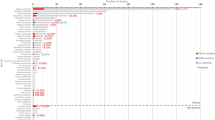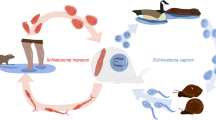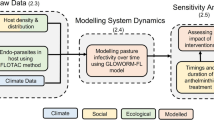Abstract
A recently reestablished and increasing population of Hawaiian monk seals in the main Hawaiian Islands (MHI) is encouraging for this endangered species. However, seals in the MHI may be exposed to a broad range of human, pet, livestock, and feral animal pathogens. Our objective was to determine the movement and foraging habitats of Hawaiian monk seals in the MHI relative to the potential exposure of seals to infectious diseases in near-shore marine habitats. We captured 18 monk seals in the MHI between January 27, 2004 and November 29, 2005, tested them for various infectious diseases, and then monitored the foraging movements of 11 of them using satellite-linked radio transmitters for the next 32–167 days. All seals tested negative for canine adenovirus, calicivirus, four morbilliviruses, phocine herpes virus, Leptospira sp., and feline and canine heartworm antigen/antibody. Six of the seals tested positive on complement fixation for Chlamydophila abortus (formerly Chlamydia psittaci). Four seals demonstrated positive titers to Sarcocystis neurona, two to Neospora caninum, and two to Toxoplasma gondii. Fecal cultures showed approximately half (n = 6) positive for E. coli 0157, no Salmonella sp., and only one with Campylobacter sp. Satellite monitored seals spent considerable time foraging, traveling, and resting in neritic waters close to human population centers, agricultural activity, and livestock ranges, and sources of land-based water runoff and sewage dispersal. Consequently, Hawaiian monk seals in the MHI may be at risk of exposure to several infectious disease agents associated with terrestrial animals that can contaminate marine habitats from runoff along drainages and that are known to cause disease in marine mammals. Further, some seals overlapped substantially in their use of coastal habitats and several moved among islands while foraging and were seen on beaches near each other. This suggests that diseased seals could infect healthy conspecifics throughout the MHI.



Similar content being viewed by others
References
Aguirre AA (2000) Health assessment and disease status studies of the Hawaiian monk seal (Monachus schauinslandi). NOAA/NMFS Administrative Report H-00-10:1–44
Aguirre AA, Reif JJ, Antonelis GA (1999) Hawaiian monk seal epidemiology plan: health assessment and disease status studies. NOAA-TM-NMFS-SWFSC-280:1–63
Anderson BS, Minette HP (1986) Leptospirosis in Hawaii: shifting trends in exposure, 1907–1984. International Journal of Zoonoses 13:76–88
Appel MJ, Robson DS (1973) A microneutralization test for canine distemper virus. American Journal of Veterinary Research 34:1459–1463
Baker JD, Johanos TC (2002) Effects of research handling on the endangered Hawaiian monk seal. Marine Mammal Science 18:500–512
Baker JD, Johanos TC (2004) Abundance of the Hawaiian monk seal in the main Hawaiian Islands. Biological Conservation 116:103–110
Bevenue A, Hylin JW, Kawano, Yoshioko, Kelly TW (1972) Organochlorine pesticide residues in water, sediment, algae, and fish, Hawaii 1970–71. Pesticide Monitoring Journal 6:56–64
Brasher AM, Anthony SS (2000) Occurrence of organochlorine pesticides in stream bed sediment and fish from selected streams on the island of Oahu, Hawaii, 1998. U.S. Geologic Survey Fact Sheet 140–00, 6 pp
Brasher AM, Wolff RH (2004) Relations between land use and organochlorine pesticides, PCBs, and semi-volatile organic compounds in streambed sediment and fish on the island of Oahu, Hawaii. Archives of Environmental Contaminants and Toxicology 46:385–398
Campbell GL, Marfin AA, Lanciotti RS, Gubler DJ (2002) West Nile Virus. The Lancet Infectious Diseases 2:519–529
Colborn T, Thayer K (2000) Aquatic ecosystems; harbingers of endocrine disruption. Ecological Applications 10:949–957
Conrad PA, Miller MA, Kreuder C, James ER, Mazet J, Dabritz H, et al. (2005) Transmission of Toxoplasma: clues from the study of sea otters as sentinels of Toxoplasma gondii flow into the marine environment. International Journal of Parasitology 35:1155–1168
Costas E, Lopez-Rodas V (1998) Paralytic phycotoxins in monk seal mass mortality. Veterinary Record 142:643–644
Cousins DV, Bastida R, Cataldi A, Quse V, Redrobe S, Dow S, et al. (2003) Tuberculosis in seals caused by a novel member of the Mycobacterium tuberculosis complex: Mycobacterium pinnipedii sp. International Journal of Systematics and Evolutionary Microbiology 53(Pt 5):1305–1314
Cousins DV, Williams SN, Reuter R, Forshaw D, Chadwick B, Coughran D, et al. (1993) Tuberculosis in wild seals and characterization of the seal bacillus. Australian Veterinary Journal 70:92–97
Dalton LM, Dickerson S, Wigdahl D (2004) A serosurvey for West Nile Virus at SeaWorld San Antonio, San Antonio, Texas. IAAAM Proceedings, Galveston, Texas, April 4–9, 2004
del Piero F, Stremme DW, Habecker PL, Cantile C (2006) West Nile flavivirus polioencephalomyelitis in a harbor seal (Phoca vitulina). Veterinary Pathology 43:58–61
Dierauf LA, Gulland FMD (2001) Marine mammal unusual mortality events. In: CRC Handbook of Marine Mammal Medicine, 2nd ed., Dierauf LA, Gulland FMD (editors), Boca Raton, FL: CRC Press, pp 69–81
Dubey JP, Zarnke R, Thomas NJ, Wong SK, Van Bonn W, Briggs M, et al. (2003) Toxoplasma gondii, Neospora caninum, Sarcocystis neurona, and Sarcocystis canis-like infections in marine mammals. Veterinary Parasitology 116:275–296
Duignan PJ, Wilkinson I, Alley R (2003) New Zealand sea lion (Phocarctos hookeri) epidemic 2002. New Zealand Veterinary Journal 51:46
Everard JD, Everard COR (1993) Leptospirosis in the Caribbean. Review of Medical Microbiology 4:114–122
Fancy SG, Pank LF, Douglas DC, Curby CH, Garner GW, Amstrup SE, et al. (1988) Satellite telemetry: a new tool for wildlife research and management. United States Fish and Wildlife Service Resources Publication 171:1–54
Fenwick SG, Duignan PJ, Nicol CM, Leyland MJ, Hunter JE (2004) A comparison of Salmonella serotypes isolated from New Zealand sea lions and feral pigs on the Auckland Islands by pulsed-field gel electrophoresis. Journal of Wildlife Diseases 40:566–570
Forshaw D, Phelps GR (1991) Tuberculosis in a captive colony of pinnipeds. Journal of Wildlife Disease 27:288–295
Fujioka RS (2001) Monitoring coastal marine waters for spore-forming bacteria of faecal and soil origin to determine point from non-point source pollution. Water Science Technology 44:181–188
Harting AL (2002) Stochastic simulation model for the Hawaiian monk seal. Dissertation, Bozeman, MT: Montana State University
Harwood J, Hall A (1990) Mass mortality in marine mammals: its implications for population dynamics and genetics. Trends in Ecology and Evolution 5:254–257
Hill DE, Chirukandoth S, Dubey JP (2005) Biology and epidemiology of Toxoplasma gondii in man and animals. Animal Health Research Review 6:41–61
Honnold SP, Braun R, Scott DP, Sreekumar C, Dubey JP (2005) Toxoplasmosis in a Hawaiian monk seal (Monachus schauinslandi). Journal of Parasitology 91:695–697
Hunter CL, Stephenson MD, Tjee-dema RS, Crosby DG, Ichikawa GS, Goetzl JD, et al. (1995) Contaminants in oysters in Kaneohe Bay, Hawaii. Marine Pollution Bulletin 10:646–654
Jepson PD, Brew S, MacMillanAP, Baker JR, Barnett J, Kirkwood JK, et al. (1997) Antibodies to Brucella in marine mammals around the coast of England and Wales. Veterinary Record 141:513–515
Johanos TC, Baker JD (2002) The Hawaiian monk seal in the Northwestern Hawaiian Islands, 2000. NOAA Tech Memo NOAA-TM-NMFS-SWFSC 340
Johnson DC, Reynolds KA, Gerra CP, Pepper L, Rose JB (1995) Detection of Giardia and Cryptosporidium in marine waters. Water Science Technology 31:439–442
Katz AR, Ansdell VE, Effler PV, Middleton CR, Sasaki DM (2002) Leptospirosis in Hawaii, 1974-1988: epidemiologic analysis of 353 laboratory-confirmed cases. American Journal of Tropical Medicine Hygiene 66:61–70
Kavlock RJ, Daston GP, DeRosa C, Fenner-Crisp P, Gray LE, Kaattari S, et al. (1996) Research needs for the risk assessment of health and environmental effects of endocrine disruptors. A report of the U.S. EPA sponsored workshop. Environmental Health Perspectives 104:715–739
Kilpatrick AM, Gluzberg Y, Burgett J, Daszak P (2004) Quantitative risk assessment of the pathways by which West Nile virus could reach Hawaii. EcoHealth 1:205–209
Lehman N, Decker DJ, Stewart BS (2004) Divergent patterns of variation in major histocompatibility complex class II alleles among Antarctic phocid pinnipeds. Journal of Mammalogy 85:1215–1244
Lopes TJ, Furlong ET (2001) Occurrence and potential adverse effects of semivolatile organic compounds in streambed sediment, United States, 1992–1995. Environmental Toxicology Chemistry 20:727–737
Madhun YA, Freed VH (1990) Impact of pesticides on the environment. In: Pesticides in the Soil Environment: Processes, Impacts, and Modeling, Cheng HH (editor), Madison, WI: Soil Science Society of America, Inc., pp 429–466
Miller DL, Ewing RY, Bossart GD (2001) Emerging and resurging diseases. In: CRC Handbook of Marine Mammal Medicine, 2nd ed., Dierauf LA, Gulland FMD (editors), Boca Raton, FL: CRC Press, pp 15–30
Miller MA, Gardner IA, Kreuder C, Paradies DM, Worcester KR, Jessup DA, et al. (2002) Coastal freshwater runoff is a risk factor for Toxoplasma gondii infection of southern sea otters (Enhydra lutris nereis). International Journal of Parasitology 32:997–1006
Murty AS (1986) Sublethal effects of pesticides on fish. In: Land Use and Organochlorine Pesticides 397. Toxicity of Pesticides to Fish, Vol II, Murty AS (editor), Boca Raton, FL: CRC Press, pp 55–100
Office International des Epizooties (OIE) (2000) Manual of Standards for Diagnostic Tests and Vaccines. World Organization for Animal Health, Paris
Oki DS, Brasher AMD (2003) Environmental setting and implications for water quality and aquatic biota, Oahu, Hawaii. U.S. Geological Survey Water Resources Investigations Report 03-4156, 98 pp
Osterhaus A, Groen J, Neisters H, Van de Bildt M, Vedder BML, Vos J, et al. (1997) Morbillivirus in monk seal mass mortality. Nature 388:838–839
Osterhaus A, van de Bildt M, Vedder L, Martina B, Niesters H, Vos J, et al. (1998) Monk seal mortality: virus or toxin? Vaccine 16:979–981
Pearson TH, Rosenberg R (1978) Macrobenthic succession in relation to organic enrichment and pollution of the marine environment. Oceanography and Marine Biology Annual Review 16:229–311
Raga JA, Balbuena JA, Aznar J, Fernandez M (1997) The impact of parasites on marine mammals: a review. Parasitologia 39:293–296
Ross HM, Jahans KL, MacMillan AP, Reid RJ, Thompson PM, Foster G (1996) Brucella species infection in North Sea seal and cetacean populations. Veterinary Record 138:647–648
Ross P, DeSwart R, Addison R, Van Loveren H (1996) Contaminant-induced immunotoxicity in harbour seals: wildlife at risk? Toxicology 112:157–169
Saliki JT, Lehenbauer TW (2001) Monoclonal antibody-based competitive enzyme-linked immunosorbent assay for detection of morbillivirus antibody in marine mammal sera. Journal of Clinical Microbiology 39:1877–1881
Schmitt CJ, Zajicek JL, Peterman PH (1990) National Pesticide Monitoring Program: residues of organochlorine chemicals in U.S. freshwater fish, 1976–1984. Archive of Environmental Contaminant and Toxicology 19:748–781
Smith AK, Ajani PA, Roberts DE (1999) Spatial and temporal variation in fish assemblages exposed to sewage and implications for management. Marine Environmental Research 47:241–260
Smith AW, Prato CM, Skilling DE (1977) Characterization of two new serotypes of San Miguel sea lion virus. Intervirology 8:30–36
Smith SDA (1996) The effects of domestic sewage effluent on marine communities at Coffs Harbour, New South Wales. Australian Marine Pollution Bulletin 33:7–12
Stewart BS, Leatherwood S, Yochem PK, Heide-Jorgensen MP (1989) Harbor seal tracking and telemetry by satellite. Marine Mammal Science 5:361–375
Stewart BS, Yochem PK (2004a) Use of marine habitats by Hawaiian monk seals (Monachus schauinslandi) from Kure Atoll: satellite-linked monitoring in 2001–2002. NOAA Fisheries Pacific Islands Fish Science Center Administrative Report H-04-01C:1-109
Stewart BS, Yochem PK (2004b) Use of marine habitats by Hawaiian monk seals (Monachus schauinslandi) from Laysan Island: satellite-linked monitoring in 2001–2002. NOAA Fisheries Pacific Islands Fish Science Center Administrative Report H-04-02C:1-127
Stoddard RA, Gulland FMD, Atwill ER, Lawrence J, Jang S, Conrad PA (2005) Salmonella and Campylobacter spp. in northern elephant seals, California. Emerging Infectious Diseases. Available: http://www.cdc.gov/ncidod/EID/vol11no12/05-0752.htm [accessed March 2006]
Tanita R, Johnson JM, Chun M, Maciolek J (1976) Organochlorine pesticides in the Hawaii Kai marina, 1970–74. Pesticide Monitoring Journal 10:24–29
Thomas NJ, Cole RA (1996) The risk of disease and threats to the wild population. Endangered species update. Conservation and Management of Southern Sea Otters. Special Issue 13:23–27
Thrusfield M (1995) Veterinary Epidemiology, 2nd ed., Cambridge, MA: Blackwell Science, 479 pp
Underwood AJ, Chapman MG (1996) Subtidal assemblages on rocky reefs at a cliff-face sewage outfall (North Head, Sydney, Australia): what happened when the outfall was turned off? Marine Pollution Bulletin 33:293–302
van Loveren H, Ross PS, Osterhaus AD, Vos DJG (2000) Contaminant-induced immunosuppression and mass mortalities among harbor seals. Toxicology Letters 15:112–113:319–324
Wait DA, Sobsey MD (2001) Comparative survival of enteric viruses and bacteria in Atlantic Ocean seawater. Water Science Technology 43:139–142
Wallace GD (1973) The role of the cat in the natural history of Toxoplasma gondii. American Journal of Tropical Medicine and Hygiene 22:313–322
Weber D, Stewart BS, Garza JC, Lehman N (2000) An empirical genetic assessment of the severity of the northern elephant seal population bottleneck. Current Biology 10:1287–1290
Woods R, Cousins DV, Kirkwood R, Obendorf DL (1995) Tuberculosis in a wild Australian fur seal (Arctocephalus pusillus doriferus) from Tasmania. Journal of Wildlife Diseases 31:83–86
Work TM, Massey JG, Lindsay DS, Dubey JP (2002) Toxoplasmosis in three species of native and introduced Hawaiian birds. Journal of Parasitology 88:1040–1042
Work TM, Massey JG, Rideout BA, Gardiner CH, Ledig DB, Kwok OCH, et al. (2000) Fatal toxoplasmosis in free-ranging endangered ‘Alala from Hawaii. Journal of Wildlife Diseases 36:205–212
World Health Organization (WHO) (1999) Leptospirosis worldwide, 1999. Weekly Epidemiological Record 74:237–242
Worton BJ (1987) A review of models of home range for animal movement. Ecological Modeling 38:277–298
Worton BJ (1989) Kernel methods for estimating the utilization distribution in home-range studies. Ecology 70:164–168
Yates JR III, Tamashiro M (1990) The Formosan subterranean termite in Hawaii. HITAHR, College of Tropical Agriculture and Human Resources, University of Hawaii, Honolulu, HI, 4 pp
Yochem PK, Braun RC, Ryon B, Baker JD, Antonelis GA (2004) Contingency plan for Hawaiian monk seal unusual mortality events. NOAA Tech Memo NMFS-PIFSC-2:1–27
Acknowledgments
This project was funded by a NOAA Prescott Grant #NA03NMF4390011. We are very grateful for the large amount of help finding, accessing, and handling the monk seals in this study. We thank the members of PIFSC MMRP (particularly L. Kashinsky), S. Farry, G. Johnston, B. Ryon, M. Carnevale, National Park Service on Molokai, D. Tokishi, C. King, the Kahoolawe Island Reserve Commission, D.B. Dunlap, G. Olayvar at the Kaneohe Marine Corps Base Hawaii, and the Kauai Monk Seal Watch.
Author information
Authors and Affiliations
Corresponding author
Rights and permissions
About this article
Cite this article
Littnan, C.L., Stewart, B.S., Yochem, P.K. et al. Survey for Selected Pathogens and Evaluation of Disease Risk Factors for Endangered Hawaiian Monk Seals in the Main Hawaiian Islands. EcoHealth 3, 232–244 (2006). https://doi.org/10.1007/s10393-006-0059-z
Published:
Issue Date:
DOI: https://doi.org/10.1007/s10393-006-0059-z




